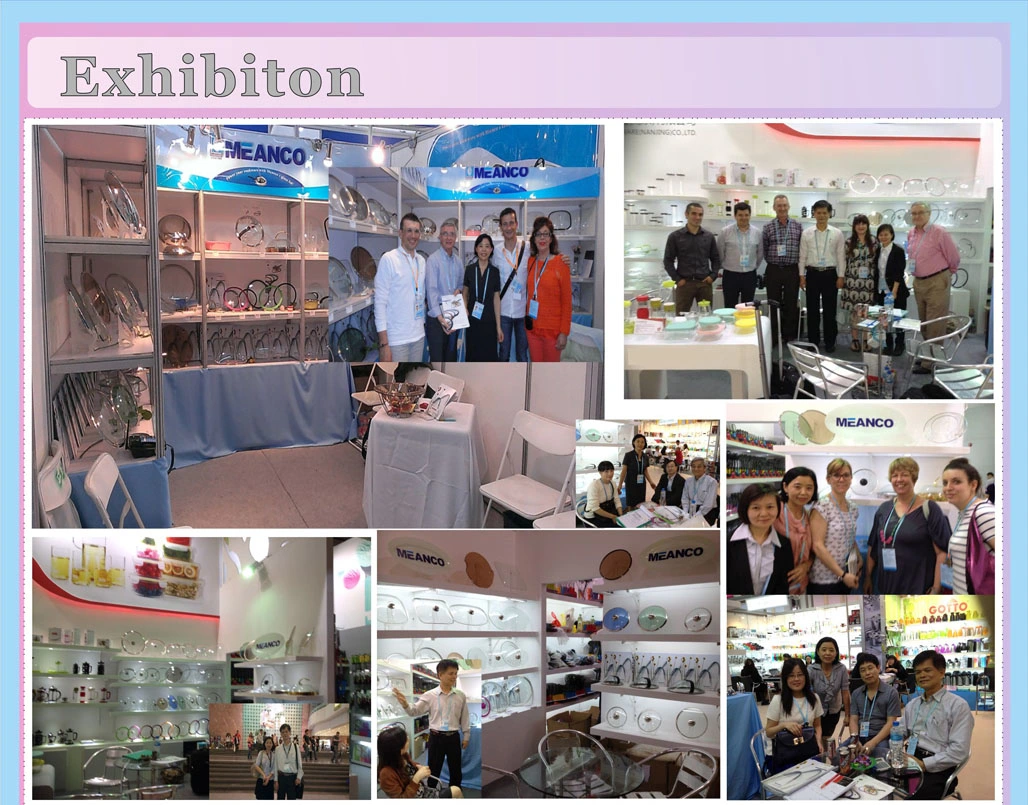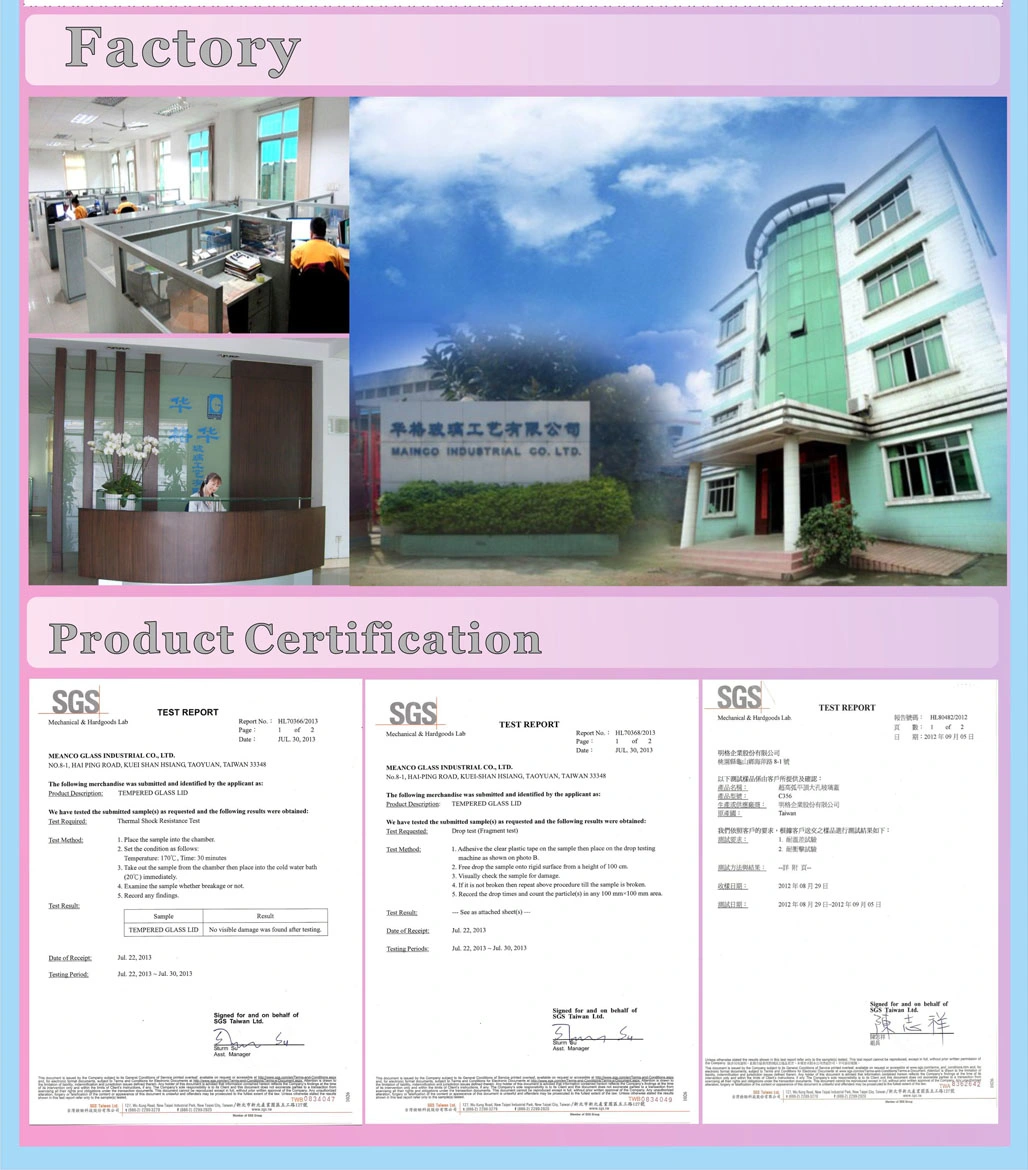Material of tempered glass lid: Float glass
Optional stainless steel rim: SUS201, SUS202, SUS301, SUS304
Diameter: 10-50cm (Max. Dia. 50cm for round type, Max. Diagonal line length 45cm for square or rectangular lid )
Thickness: 4mm or 5mm
Heat resistance: 320 degree centigrade
Thermal shock: 180 degree centigrade
Break-resistance: Five times of normal glass
Excellent transparency allows for checking on cooking food at a glance
Shape: Square, round, oval, rectangle
Colors: Clear, blue, green, brown, etc.
Optional steam vent, logos and decorations.
Dishwasher safe for easy clean up
Delivery time 20-30 days after sample and order confirmation (20'FLC)
Sample Terms: Samples are available upon receipt of your requests
Package detail: Inner packing: Lined with Alikali paper, Outer pakcing: 5 ply-corrugated cartons


Test for quality control:
1. FLATNESS CHECK
Place the glass lid on a completely smooth table , and put a piece of 1mm thickness iron plate beside the ring the glass lid, then moving the iron gauge along with the circumference of the lid, the glass lid passes the test if the iron plate does not push in
2. THTERMAL SHOCK
Put the glass lid into oven temperature to 200°C, and constant temperature for 30 minutes, remove it immediately into 20°C water , glass no broken or crack
3. IMPACT TEST
Place a lid, domed size up, on a hard surface,
Dropping a 225 grams steel ball from a height of 1.5meter,
No fracture no shatter, to pass
Note : Don't drop the ball near or onto a vent hole /rivet hole
4. SCRATCH TEST (PRESSURE TEST)
Use 120-grit (abrasive paper ) sandpaper to scratch two side and three directions 15 times, then put into room temperature water for 15 minutes, it pass if no breakage and no crack.
5. POLOLARISCOPE CHECK
To test the balance of compressive stress and tensile stress depends on the color what you see.
6. FRAGMENTATION CHECK
Apply tape (adhesive film)on the convex (front) surface of the lid, domed side upward, break it with a hammer broken 5X5cm measuring range , number of particles (fragments) counted should be at least 40,
The purpose of this test is to determine whether the glass has been adequately toughened.
Optional stainless steel rim: SUS201, SUS202, SUS301, SUS304
Diameter: 10-50cm (Max. Dia. 50cm for round type, Max. Diagonal line length 45cm for square or rectangular lid )
Thickness: 4mm or 5mm
Heat resistance: 320 degree centigrade
Thermal shock: 180 degree centigrade
Break-resistance: Five times of normal glass
Excellent transparency allows for checking on cooking food at a glance
Shape: Square, round, oval, rectangle
Colors: Clear, blue, green, brown, etc.
Optional steam vent, logos and decorations.
Dishwasher safe for easy clean up
Delivery time 20-30 days after sample and order confirmation (20'FLC)
Sample Terms: Samples are available upon receipt of your requests
Package detail: Inner packing: Lined with Alikali paper, Outer pakcing: 5 ply-corrugated cartons


Test for quality control:
1. FLATNESS CHECK
Place the glass lid on a completely smooth table , and put a piece of 1mm thickness iron plate beside the ring the glass lid, then moving the iron gauge along with the circumference of the lid, the glass lid passes the test if the iron plate does not push in
2. THTERMAL SHOCK
Put the glass lid into oven temperature to 200°C, and constant temperature for 30 minutes, remove it immediately into 20°C water , glass no broken or crack
3. IMPACT TEST
Place a lid, domed size up, on a hard surface,
Dropping a 225 grams steel ball from a height of 1.5meter,
No fracture no shatter, to pass
Note : Don't drop the ball near or onto a vent hole /rivet hole
4. SCRATCH TEST (PRESSURE TEST)
Use 120-grit (abrasive paper ) sandpaper to scratch two side and three directions 15 times, then put into room temperature water for 15 minutes, it pass if no breakage and no crack.
5. POLOLARISCOPE CHECK
To test the balance of compressive stress and tensile stress depends on the color what you see.
6. FRAGMENTATION CHECK
Apply tape (adhesive film)on the convex (front) surface of the lid, domed side upward, break it with a hammer broken 5X5cm measuring range , number of particles (fragments) counted should be at least 40,
The purpose of this test is to determine whether the glass has been adequately toughened.